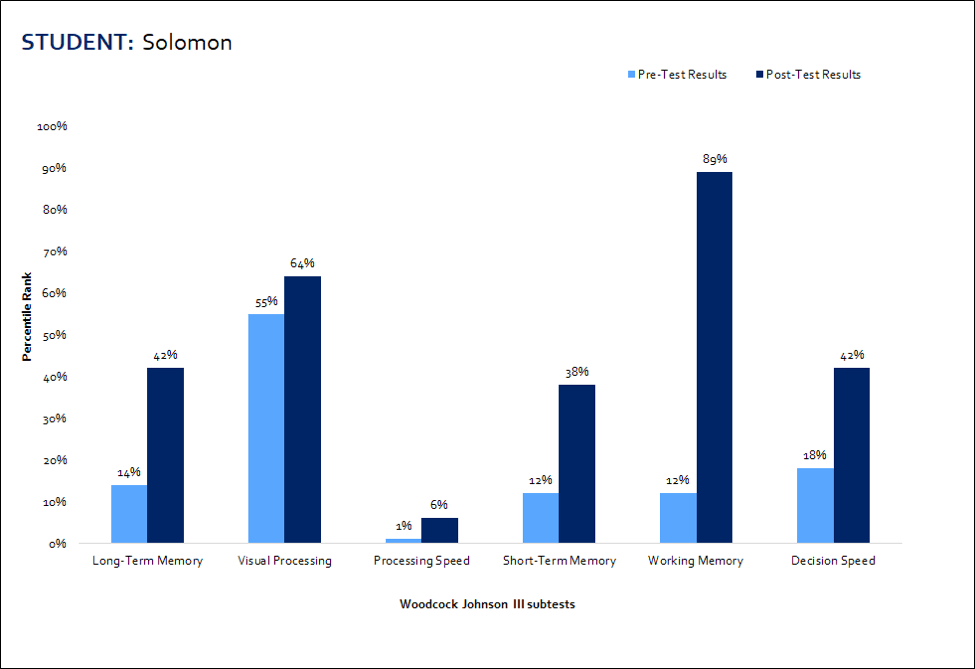Solomon
Solomon
- Name: Solomon
- Age: 11
Dyslexia

Solomon started his program with significant learning struggles. His weaknesses in attention, working memory, and processing speed, compiled with dyslexia, made it difficult for Solomon to read, write, learn new concepts, and sustain focus.
His program goals included strengthening his processing skills (attention, working memory, and processing speed), improving his long-term memory and metacognition, and regulating his behavior/control impulses, so that he can learn things with less difficulty.
When Solomon began training, as soon as he perceived a task to be difficult, he displayed avoidance behaviors and became easily distracted, tired, bored, or fidgety. He showed fatigue relatively quickly and experienced frequent frustration, disdain, and low self-esteem regarding his ability to learn and work on tasks independently.
Some of Solomon’s strengths were his energetic personality and his motivation to perform well. These were important assets to his success in the program.
Solomon’s processing skills were drilled with various exercises that were modified to meet his ability and customized to maintain his engagement. Learning trials also were set up for Solomon to identify and reflect when his approach is not working and to open conversation to what cognitive skills are, how they work together, and how they can be impacted by factors such as fatigue and hunger.
Solomon also was taught memory techniques and strategies. He eventually applied a technique called mnemonics to learn the rules for the different techniques and used a notebook to store all the different mind maps he made.
For Solomon’s working memory, he practiced exercises that forced him to manipulate and hold onto information. Creating short, achievable goals within exercises allowed Solomon to stay engaged and motivated throughout his slow but steady rate of progress. He now demonstrates the ability to hold onto directions, and calls upon important information to make decisions, complete tasks, & store new material.
Solomon worked hard to build cognitive stamina and developed strategies to re-energize, regain focus and maintain attention, self-motivate by creating mini-goals, and remember hard-to-recall information by asking problem-solving questions. Solomon increased his ability to work more quickly on tasks that required decision-making, multi steps, and sustained attention—now, he often works twice as fast.
With his improved processing skills, he successfully advanced through several reading levels in a reading remediation program with which he had previously struggled. He is able to work independently to chunk reading passages into smaller, more manageable sections. He remembers what steps he should take to successfully store the information he read, and does not require assistance in moving from one step to the next.
He now possesses an independent ability to learn new material by combining and applying several different memory techniques. He is able to provide metaphors describing their importance and examples of applying them in new situations. When asked how he could apply them, he provided the example, “After I read something, I ask myself, what can I connect this to? What can I imagine? Then I draw those things”.
One of Solomon’s greatest accomplishments during his program was his ability to store and recall over 30 English monarchs, including small biographies, battles, and the chronological order of rule by combining techniques like visualization, mind mapping, and the method of loci. He is excited and confident in his ability to learn and remember, and is ready to take on a more rigorous academic schedule.



